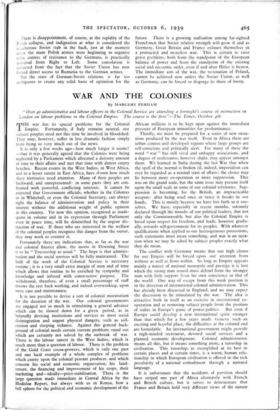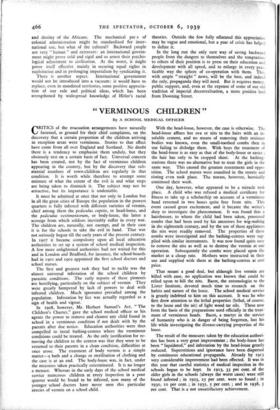WAR AND THE COLONIES
By MARGERY PERHAM
"Over 40 administrative and labour officers in the Colonial Service are attending a fortnight's course of instruction in London on labour problems in the Colonial Empire. The course is the first."—The Times, October 4th.
THE war has its special problems for the Colonial Empire. Fortunately, if Italy remains neutral, our subject peoples need not this time be involved in bloodshed. They may, however, suffer in less dramatic fashion simply from being so very much out of the news.
It is only a few weeks ago—how much longer it seems!
—that it was generally agreed that the Colonies were being neglected by a Parliament which allocated a derisory amount of time to their affairs and met that time with almost empty benches. Recent events in the West Indies, m West Africa, and to a lesser extent in East Africa, have sl.own how much these territories need attention. Many of their peoples are backward, and unrepresented: in some parts they are con- fronted with powerful, .conflicting interests. It cannot be expected that Government officials, whether in the Colonies or in Whitehall, or even the Colonial Secretary, can always right the balance of administration and policy in their interest without the additional weight of public opinion in this country. Yet now this opinion, recognised as inade- quate in volume and in its expression through Parliament even in peace time, will be diminished by the urgent dis- traction of war. If those who are interested in the welfare of the colonial peoples recognise this danger from the outset, they may work to counter it.
Fortunately there are indications that, as far as the war and colonial finance allow, the motto in Downing Street is to be " Trusteeship as usual." The hope is that adminis- tration and the social services will be fully maintained. The bulk of the work of the Colonial Service is necessary routine ; it is a very small extra margin of men and of time which allows that routine to be enriched by sympathy and knowledge and infused with constructive purpose. The withdrawal, therefore, of even a small percentage of staff throws the rest back working, and indeed overworking, upon mere care and maintenance.
It is not possible to devise a sort of colonial moratorium for the duration of the war. Our colonial governments are engaged not so much in stimulating a general advance which can be slowed down for a given period, as in belatedly devising institutions and services to meet social disintegration and urgent physical dangers, such as soil- erosion and sleeping sickness. Against this general back- ground of colonial needs certain current problems stand out which are certainly not solved by the outbreak of war.
There is the labour unrest in the West Indies, which is much more than a question of labour. There is the problem of the Gold Coast cocoa-growers, which is only one part and one local example of a whole complex of problems which centre upon the colonial peasant producer, and which concern his social and economic organisation, his land- tenure, the financing and improvement of his crops, their marketing and—ideally—price-stabilisation. There is the large question made immediate in Central Africa by the Bledisloe Report, but always with us in Kenya, how a full sphere for the political and economic development of the African millions is to be kept open against the immediate pressure of European minorities for predominance.
Thirdly, we must be prepared for a series of new situa- tions produced by the war itself. Even in Africa there are urban centres and developed regions where large groups are self-conscious and politically alert. For many of these the word `! war " has still vivid and unhappy associations, and a degree of restlessness, however slight, may appear amongst them. We learned in India during the last War that when the spell of the normal is broken (if, indeed, imperialism can ever be regarded as a normal state of affairs) the choice may lie between more co-operation or more suppression. This was on the grand scale, but the same issue may present itself upon the small scale in some of our colonial territories. Sup- pression is becoming, for the British, an impracticable weapon: after being used once or twice it breaks in our hands. This is mainly because we have lost faith in it our- selves. We have, especially in recent months, solemnly declared through the mouths of our political leaders, that not only the Commonwealth, but also the Colonial Empire is based upon respect for freedom, and leads, however gradu- ally, towards self-government for its peoples. With whatever qualifications when applied to our heterogeneous possessions, such statements must mean something, and war is an occa- sion when we may be asked by subject peoples exactly what they do mean.
The conflict with Germany means that our high claims for our Empire will be forced upon our attention from without as well as from within. So long as Empire appears mainly a matter of national monopoly and prestige it is loot which the strong man armed must defend from the stronger man with little support from his own conscience or that of the world. One way of escape from this weak position is in the direction of international colonial administration. This has already been discussed in England, and we may expect the discussion to be stimulated by the war. The idea is attractive both in itself as an exercise in international co- operation and as removing subject people from the position of stakes in Europe's game of power-politics. But even if Europe could develop a new international spirit stronger than that which for a few years made Geneva such an exciting and hcyeful place, the difficulties at the colonial end are formidable. An international government might provide a nigh-minded secretariat, devoted social services and a planned economic development. Colonial administration means all this, but it means something more, a tutorship in civilisation. This tutorship, as exemplified at its best in certain places and at certain times, is a warm, human rela- tionship in which European civilisation is offered in the rich peculiarity of a national embodiment through a national language.
It is unfortunate that the accidents of partition should have striped one part of Africa alternately with French and British culture, but it serves to demonstrate that France and Britain hold very different views of the nature and destiny of the Africans. The mechanical pat..s of colonial administration might be standardised for inter- national use, but what of the cultural? Backward people are very " human " and extravert: an international govern- ment might prove cold and rigid and so arrest their psycho- logical adjustment to civilisation. At the worst, it might prove itself effective mainly in securing equal rights in exploitation and in prolonging imperialism by syndicating it.
There is another aspect. International government would not be introduced into a vacuum: it would have to replace, even in mandated territories, some positive apprecia- tion of our rule and political ideas, which has been strengthened by widespread knowledge of Hitler's racial theories. Outside the few fully educated this appreciation may be vague and emotional, but a year of crisis has helped to define it.
In the long run the only sure way of saving backward people from the dangers to themselves and the temptation, to others of their position is to press on their education and development with all speed, and to enlarge in every prac- ticable way the sphere of co-operation with them.
with ample " straight " news, will be the best, and indeed the only, propaganda they will need. But it requires money. public support, and, even at the expense of some of our old tradition of imperial decentralisation, a more positive lead from Downing Street.



































 Previous page
Previous page